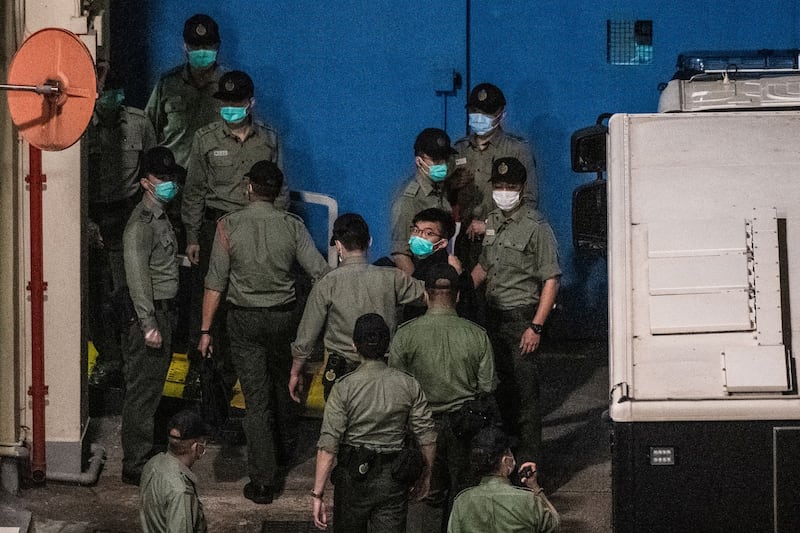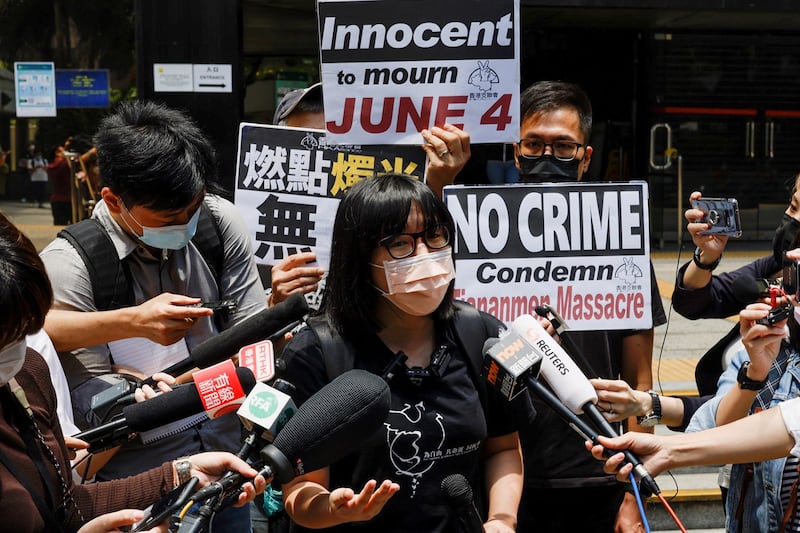Trump administration officials rejected a request for political asylum from jailed pro-democracy activist Joshua Wong just before Beijing imposed a draconian security law on the city, according to a new book about democracy movements in Hong Kong and China.
“Among the Braves” by former Washington Post Hong Kong correspondent Shibani Mahtani and The Atlantic’s Timothy McLaughlin gives an account of Wong’s asylum bid, quoting U.S. officials as saying it was rejected due to the “national interest,” despite it being clear that Wong would be arrested and jailed if they did nothing.
The security law ushered in a mass crackdown on public protest, pro-democracy media and former opposition lawmakers.
Wong, who had no way of leaving the city through normal channels, initially requested a meeting with consular officials, who didn't meet with him on the grounds of the consulate, but at private offices that lacked the diplomatic protection he needed, according to the book.
They told him he couldn’t apply for political asylum from overseas, although Wong knew that dissidents had sheltered in U.S. missions before, prior to being sent to the United States.

Wong sent an email formally requesting political asylum to State Department officials via his close associate Jeffrey Ngo that was forwarded to then-U.S. Secretary of State Mike Pompeo, who discussed the request with officials before rejecting it, the book, which was recently published by Hachette in New York, says.
“Within the next 48 hours, Pompeo summoned his half-dozen or so top officials to discuss Joshua’s request,” Mahtani and McLaughlin write.
They immediately ruled out sheltering him at the U.S. consulate in Hong Kong, despite there having been a precedent for such actions in the sheltering of dissident physicist Fang Lizhi and his wife in the U.S. embassy in Beijing for around a year in the wake of the 1989 student-led protests and the Tiananmen massacre that followed, according to the book.
Pompeo and his officials feared Beijing would simply shut down the consulate if they harbored Wong, given that Washington was planning to close the Chinese consulate in Houston.
“The only route that seemed viable was covertly extracting Joshua out of Hong Kong in an undercover operation ... over water,” the journalists write.
‘Realpolitik’ wins out
But there were concerns over the secrecy of the operation, and over the possibility the mission would be scuppered by a Chinese coast guard patrol.
“With American involvement, it could soon snowball into an international incident,” Mahtani and McLaughlin write.
“Pompeo with his advisers decided that there was no way to facilitate Joshua’s protection,” their book says, citing “realpolitik” as the reason for the decision.
“You’ve got national interest and personal interest, and some ways you try to find a balance between the two,” the book quotes a senior official involved in the process as saying.
“In the end, you know, on the 7th floor of the State Department, national interest won out.”
The book also cites National Security Council official Matt Pottinger as saying that he was upset at the decision, realizing it would mean Wong’s eventual detention in Hong Kong, but deferred to Pompeo’s team because they had a “fuller picture.”
It quotes Pottinger’s deputy Ivan Kanapathy as saying that fear of Beijing’s reprisals was “the absolute wrong” reason to deny Wong’s request, however.
Multiple attempts were made both on Capitol Hill and secretly by exiled former lawmaker Nathan Law to persuade officials to consider Wong's request, and to persuade the State Department to change its mind, but nothing came of them.
“There was still no offer of protection by the time the security law passed,” the book says. “Instead, diplomats were speaking legalese, explaining that one couldn’t technically apply for asylum from outside the United States itself.”
"Joshua and Jeffrey knew that," Mahtani and McLaughlin write. "They were asking for the same pathway to safe haven that had been granted to Fang Lizhi and Chen Guangcheng."
‘Biggest disappointment of all’
Wong was arrested on Sept. 24, 2020, on charges of "unlawful assembly" linked to his participation in the 2019 protest movement, one of a slew of prison sentences on similar charges.
He is currently among 47 former pro-democracy activists and opposition lawmakers awaiting trial for "subversion" under the National Security Law for organizing a democratic primary, which carries a maximum penalty of life imprisonment.

“Among the Braves” also takes aim at the Trump administration for failing to offer a lifeboat policy to Hong Kongers trying to flee the crackdown.
“Perhaps the biggest disappointment of all was the United States,” the book says. “Few movements hitched their wagon to Washington quite as much as the Hong Kong one.”
"Some protesters flew American flags on the street, appealed to Trump's gigantic ego," Mahtani and McLaughlin write. "What [Washington] could have offered was a safe haven, but it didn't."
Britain, Canada and Australia have rolled out lifeboat visa schemes with potential pathways to citizenship for Hong Kongers, but "there remains no lifeboat policy for Hong Kongers who want to emigrate to the US," the book says.
The London-based rights group Hong Kong Watch has warned that almost two million Hong Kongers lack a viable route out of the city as they are ineligible for the lifeboat visas currently on offer from the U.K., Canada and Australia.
Requests to the State Department for comment on the book’s account made on Wednesday had met with no reply by the time of writing.
Translated by Luisetta Mudie .
